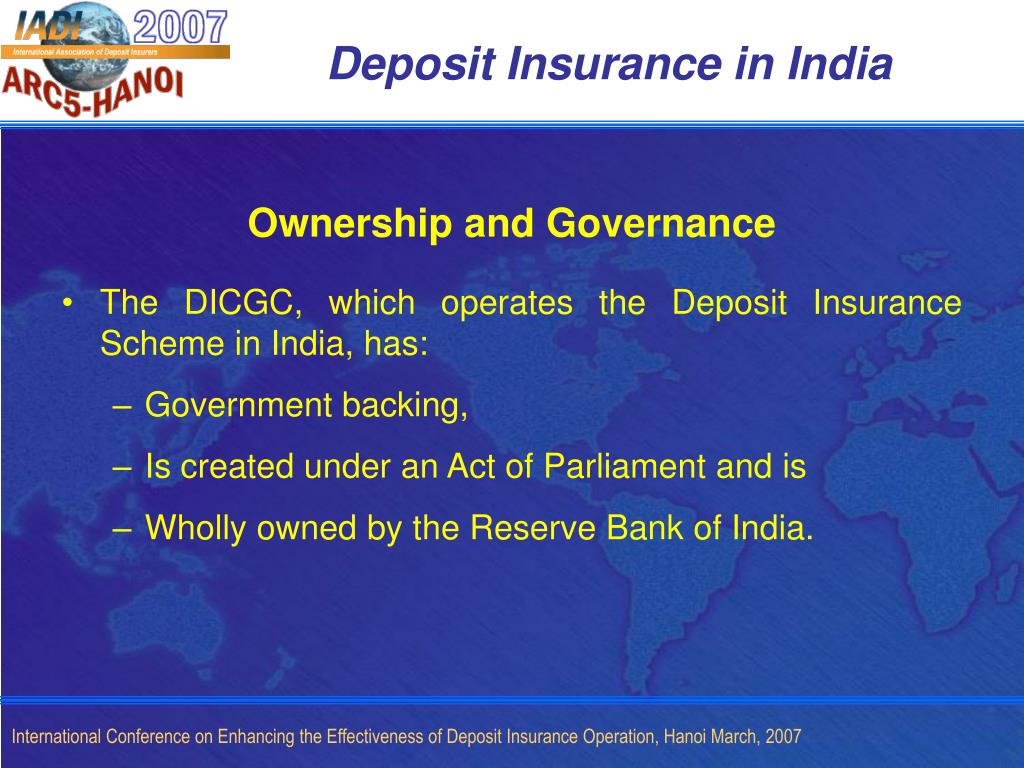Read latest news and live updates on Dicgc-act including breaking news on Dicgc-act,Dicgc-act photos,Dicgc-act videos and many more at cnbctv18.com. Generally in India, the bank deposits are covered under the insurance scheme provided by DICGC full form Deposit Insurance and Credit Guarantee Corporation. This is a wholly owned subsidiary of the Reserve Bank of India (RBI). This was established on July 15, 1978 under Deposit Insurance and Credit Guarantee Corporation Act, 1961. The DICGC while registering the banks as insured banks furnishes them with printed leaflets for display giving information relating to the protection afforded.
Know how much your Bank Deposit is Safe and Covered by Insurance of DICGC
What is the role of DICGC?

DICGC stands for Deposit Insurance and Credit Guarantee Corporation. The functions of the DICGC are governed by the provisions of The Deposit Insurance and Credit Guarantee Corporation Act, 1961 (DICGC Act) and The Deposit Insurance and Credit Guarantee Corporation General Regulations, 1961 framed by the RBI in exercise of the powers conferred by Section 50(3) of the said Act.
The preamble of the Deposit Insurance and Credit Guarantee Corporation Act, 1961 states that it is an Act to provide for the establishment of a Corporation for the purpose of insurance of deposits and guaranteeing of credit facilities and for other matters connected therewith or incidental thereto. It is basically a safety net for bank deposits in India.
With a view to providing a greater measure of protection to depositors in banks the DICGC, raised the limit of insurance cover for depositors in insured banks from the present level of Rs 1 lakh to Rs 5 lakh per depositor with effect from 4th February, 2020 with the approval of Government of India. If a bank undergoes severe stress and is likely to fold, in such situations an account holders deposits up to Rs.5 lakh are insured by DICGC.
What does the DICGC insure?
The DICGC insures all deposits such as savings, fixed, current, recurring, etc. deposits except the following types of deposits:-
Deposits of foreign Governments;
Deposits of Central/State Governments;
Inter-bank deposits;
Deposits of the State Land Development Banks with the State co-operative bank;
Any amount due on account of and deposit received outside India
Any amount, which has been specifically exempted by the corporation with the previous approval of RBI.
What is the maximum deposit amount insured by the DICGC?
Each depositor in a bank is insured upto a maximum of 5,00,000 for both principal and interest amount held by him. The deposits kept in different branches of a bank are aggregated for the purpose of insurance cover and a maximum amount of upto Rupees five lakhs is paid.
Which banks are insured by the DICGC?
All commercial banks including branches of foreign banks functioning in India, local area banks and regional rural banks are insured by the DICGC.
The insurance cover is also extended to all the state, central and primary co-operative banks which have the amendments to allow RBI to intervene, wind up or supersede its management. This includes all co-operative banks.
At present all co-operative banks are covered by the DICGC.
Dicgc Chairman

Primary co-operative societies are not covered
Government and inter-bank deposits are not covered.
How is Ownership of Accounts determined?
Ownership here means bank accounts opened as individual, as a partner of a firm, as guardian for someone, as director of a company, jointly etc.
A bank will first try to aggregate accounts with the same type of ownership across all its branches before deposit insurance is determined.

Dicgc Act India
If the funds are deposited into separate banks they would then be separately insured.
How is insurance cover provided in case of joint accounts?
In the case of joint accounts, the bank will insure accounts based on the order of the names in the joint account. So a joint account in the order of X, Y and Z and another joint account of Y, Z and A will be considered separately for the insurance cover.
Will an account in the name of a proprietorship concern be considered separately from a sole proprietor while computing insurance cover?
An account opened in the name of proprietary concern where the individual is the sole proprietor, will be clubbed with the individual’s own account in his/her own capacity for insurance cover.
How is insurance cover computed?
Once the ownership is determined, all the current, savings, fixed deposits belonging to the owner are aggregated to determine the insurance cover for the account.
Although the bank guarantees the amount, it does take a while for that money to be paid to its liable depositors.
When is DICGC liable to pay?
When a bank goes into liquidation
DICGC is liable to pay to the liquidator the claim amount of each depositor upto Rs 5 lakhs within 2 months from the date of receipt of claim list from the liquidator.
Link slot judi. The liquidator has to disburse the claim amount to each insured depositor corresponding to their claim amount.
When a bank is reconstructed or amalgamated / merged with another bank
The DICGC pays the bank concerned, the difference between the full amount of deposit or the limit of insurance cover in force at the time, whichever is less and the amount received by him under the reconstruction / amalgamation scheme within 2 months from the date of receipt of claim list from the transferee bank / Chief Executive Officer of the insured bank/transferee bank as the case may be.
Source:Yojana Magazine and DIGC
BIG WINS and JACKPOTS on casino slot machines throughout the United States!Las Vegas, NV - Biloxi, MS - Atlantic City, NJ - Hollywood, FL - Columbus, OH. Slot wins this week.
Vision
To be recognised as one of the most efficient and effective deposit insurance providers, responsive to the needs of its stakeholders.
Mission
To contribute to financial stability by securing public confidence in the banking system through the provision of deposit insurance, particularly for the benefit of the small depositors. King billy casino bonus code.
Legal Framework/ Objective

- The functions of the DICGC are governed by the provisions of ‘The Deposit Insurance and Credit Guarantee Corporation Act, 1961’ (DICGC Act) and ‘The Deposit Insurance and Credit Guarantee Corporation General Regulations, 1961’ framed by the Reserve Bank of India in the exercise of the powers conferred by sub-section (3) of Section 50 of the said Act.
- The preamble of the Deposit Insurance and Credit Guarantee Corporation Act, 1961 states that it is an Act to provide for the establishment of a Corporation for the purpose of insurance of deposits and guaranteeing of credit facilities and for other matters connected therewith or incidental thereto.
Types of Deposits Covered
Are Cooperative Banks Covered Under Dicgc
DICGC insures all bank deposits, such as saving, fixed, current, recurring, etc. except the following types of deposits.

- Deposits of foreign Governments;
- Deposits of Central/State Governments;
- Inter-bank deposits
- Deposits of the State Land Development Banks with the State co-operative banks;
- Any amount due on account of and deposit received outside India
- Any amount which has been specifically exempted by the corporation with the previous approval of the RBI.
Banks covered by Deposit Insurance Scheme
- All commercial banks including the branches of foreign banks functioning in India, Local Area Banks and Regional Rural Banks.
- Co-operative Banks – All eligible co-operative banks as defined in Section 2(gg) of the DICGC Act are covered by the Deposit Insurance Scheme. All State, Central and Primary co-operative banks functioning in the States/Union Territories which have amended their Co-operative Societies Act as required under the DICGC Act, 1961, empowering RBI to order the Registrar of Co-operative Societies of the respective States/Union Territories to wind up a co-operative bank or to supersede its committee of management and requiring the Registrar not to take any action for winding up, amalgamation or reconstruction of a co-operative bank without prior sanction in writing from the RBI, are treated as eligible banks. At present all Co-operative banks are covered by the Scheme. The Union Territories of Lakshadweep and Dadra and Nagar Haveli do not have Co-operative Banks.
Dicgc Act
Management
- The authorized capital of the Corporation is 50 crore, which is fully issued and subscribed by the Reserve Bank of India (RBI). The management of the Corporation vests with its Board of Directors, of which a Deputy Governor of the RBI is the Chairman.
- As per the DICGC Act, the Board shall consist of, besides the Chairman,
- One Officer (normally in the rank of Executive Director) of the RBI
- One Officer from the Central Government
- five Directors nominated by the Central Government in consultation with the RBI, three of whom are persons having special knowledge of commercial banking, insurance, commerce, industry or finance and two of whom shall be persons having special knowledge of, or experience in co-operative banking or co-operative movement and none of the directors should be an employee of the Central Government